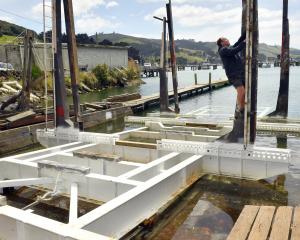
That comes in handy as a tax expert, particularly as he has spent a lot of time providing training to accountants and lawyers throughout his career, alongside dealing with his own clients.
"It’s about making what is complex understandable for people. People don’t want to know the complex, they just want to know what the answer is and understand [generally]. I certainly enjoy doing that", he said.
Known nationally for his work as a tax adviser to the agribusiness sector, Mr Marshall was recently awarded a fellowship by Chartered Accountants Australia and New Zealand, recognising his contribution to the accounting profession, and he was humbled to receive such acknowledgement from his peers.
On the surface, it might appear to be a career that was all about numbers but it was "way beyond that". Often it was dealing with people at difficult times in their lives and helping them through situations, he said.
From a dairy farming background in South Otago, the former South Otago High School pupil studied law and commerce (finance) at the University of Otago and his legal background had been very helpful given "tax is law".
"Having a bit of a legal background really helps, so much of what we do in accounting is intertwined with the legal profession. We are working together a lot. It helps to understand that gap in general",he said.
His career had been spent in Otago. He was with Findex for more than 19 years before joining CEG, as a principal, three and a-half years ago. The Dunedin-based chartered accountancy practice has 28 staff and all three owners of the firm were from South Otago farming backgrounds.
As well as providing general accounting and business advisory advice to clients, Mr Marshall was also well versed in all technical tax issues and had specialist expertise in property transactions, GST, and overseas tax issues, particularly for new migrants.
He is deputy chairman of the Chartered Accountants Australia New Zealand rural sector committee, which comprises accountants from throughout New Zealand advocating for the rural sector on a wide variety of issues on behalf of its members.
It did a lot of work around Government policy and how that was going to work for farming.
"It’s quite hard to get politicians and the public sector to get their head around how something could work in practice.
"Farmers, in particular, don’t have a problem generally with having to do things and change. It’s got to be workable, it’s got to make sense. People just want practical approaches to these problems. Farmers want to do the right thing", he said.
Mr Marshall, who spends a day a week working from the firm’s Milton office, enjoyed visiting his clients. Visiting a farm gave him a better sense of what they were doing. That was not so much about the numbers, it was more about what their plans and challenges were and how they could help clients achieve those goals.
Sheep and beef farmers who had been around for a while had been through the cycle many times and were used to ups and downs. There was "so much at the mercy of stuff they can’t control", he said.
Government policy had to support farmers to do what they did best and not be an impediment to their success.
"I think that comes from having the people who are making the policy getting out of Wellington and seeing what is going on in the rural world — and you’ll get better policy", he said.
Mr Marshall also co-authored the Farming, Forestry and Fishing Tax Guide, published by Wolters Kluwer and New Zealand Taxation, published by Thomson Reuters.
He once did a four-month secondment to a corporate accounting firm in Auckland but so much of the day taken up travelling, a permanent move to a larger centre did not appeal. Nor was he dealing with an owner "or someone your advice mattered to their back pocket".
"I get a lot more satisfaction out of ... that personal connection and knowing what you’re doing has a real impact for an owner of the business", he said.
He had a mix of clients but farmers and property developers were his two major ones.












